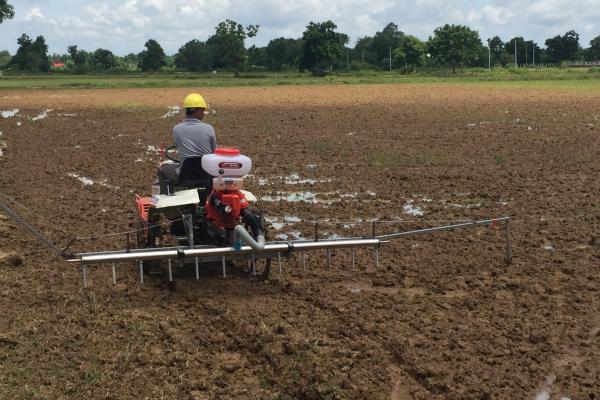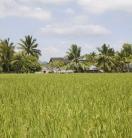Innovation to intensify, diversify Cambodian rice farms
Rice growing communities in Cambodia are boosting productivity and diversifying incomes through the widespread uptake of new farming technologies.
The innovative machinery has been introduced as part of ACIAR-funded research to sustainably intensify lowland rice systems to improve productivity, business resilience and livelihoods.
ACIAR Research Program Manager for Crops, Dr Eric Huttner said these technologies could help farmers grow more rice on the same area of land or grow different higher-value crops.
‘Growing a small amount of rice may provide basic food security for smallholders but not a significant income,’ Dr Huttner said.
‘So many of these farmers depend on off-farm income, such as seasonal migration and working in cities or overseas, for their livelihoods, but it is risky as the COVID-19 pandemic is showing.
‘Innovations in the farming system may provide an alternative path out of poverty.’
The project in north-western Cambodia is working closely with farmers to assess and disseminate innovations, including agronomic practices and equipment like seed cleaners and seeding machines.
In its fifth and final year, this project Sustainable intensification and diversification in the lowland rice system in Northwest Cambodia, or CamSID for short, is getting these innovations in-field.
Core to this project’s success has been engaging with Cambodian farmers and listening to what they need and how to best reach them, said project leader Prof Daniel Tan, University of Sydney.
Farmers said that they get most of their agronomy information from leading farmers in their village and input sellers—small shops providing them farm supplies such as fertilisers and crop protection chemicals.
The project partners have trained more than 10 farmer groups and agricultural cooperatives about improved farming systems. They are supporting these groups to establish Farmers’ Hubs that will encourage entrepreneurial activities beyond the life of the project.
For example, the project has installed a new seed cleaner at a Farmers’ Hubs in partnership with two NGOs, the Syngenta Foundation for Sustainable Agriculture and Ockenden Cambodia. This machine allows Battrang Agriculture Cooperative to produce weed-free, high-quality seed for smallholder farmers, which can increase yields by 5-20%.
The project has also worked with the Cambodian Agriculture Value Chain Program (CAVAC) to demonstrate machine direct seeding through private sector service providers.
As a result, machinery service providers and agricultural cooperatives have purchased 18 KID brand drill seeders and 490 Cambodian-invented Eli brand seeders.
Prime Minister of Cambodia Hun Sen visited the CAVAC Irrigation Scheme last July and was so impressed, he ordered 2000 Eli seeders—both wet and dry seeding versions—for smallholder farmers.
The project team has trained the provincial government agri-officers on best practice crop management, which is now incorporated in its five-day Input Seller Certificate Course.
To reach more farmers, project team members Dr Yorn Try, Nheb Khim, Ngann Seyma and Chhan Tekhong presented radio programs about the project learnings. The team has now repackaged these broadcasts into a podcast series.
‘The partners are working really well and I’m confident the scaling methodology will continue beyond the project, because it came from meeting the needs of the farmer,’ Prof Tan said.
The research project is scheduled to run until October 2021.




